)
Beyond Compliance: Turning FSMA 204 into a Competitive Advantage
Executive Summary
The Food Safety Modernization Act (FSMA) 204 is more than a regulatory hurdle—it’s a chance to transform supply chains. By requiring faster, more precise traceability of high-risk foods, the FDA aims to prevent outbreaks from becoming crises.
By adhering to the new rules, organizations can strengthen supply chain transparency, foster consumer trust, and differentiate themselves in an increasingly competitive market.
What Is FSMA 204?
The FDA’s Food Traceability Rule, known as FSMA 204, establishes enhanced recordkeeping requirements for foods on the Food Traceability List (FTL), including fresh leafy greens, soft cheeses, seafood, and nut butters.
The rule requires companies to capture and maintain Key Data Elements (KDEs) at every Critical Tracking Event (CTE) in the supply chain, such as harvesting, packing, shipping, and receiving. These records must be provided to the FDA within 24 hours of a request.
Why Now?
The urgency behind FSMA 204 is underscored by how quickly foodborne outbreaks can spiral and how painfully slow traditional traceability often is. Take the 2024 listeriosis outbreak tied to Boar’s Head deli meats: over 7 million pounds of product were recalled after dozens of illnesses and 10 deaths were linked to contaminated production at a facility.
Meanwhile, recalls of soft-ripened cheeses, enoki mushrooms, and ready-to-eat meats in late 2024 and 2025 highlight how microbial hazards persist across fresh, prepared, and chilled categories. When recalls hit across multiple food segments, only systems built with speed and granularity—capturing Key Data Elements at Critical Tracking Events—can deliver the responsiveness FSMA 204 demands.
When Does It Take Effect?
The final rule took effect in January 2023. The compliance date recently pushed 30 months from January 20, 2026, to July 20, 2028. The reason provided by the FDA for the extension is to allow companies more time to implement the necessary data traceability systems and coordinate effectively with their supply chain partners.
Companies should not expect another extension, and those that don’t act now risk being caught unprepared. Building compliant systems takes time, so acting now is the surest path to readiness.
Who Needs to Comply?
The rule applies to businesses that manufacture, process, pack, or hold foods on the FTL. That includes growers, processors, distributors, importers, wholesalers, and retailers. Some exemptions apply for small businesses and restaurants, but for most of the industry, FSMA 204 is non-negotiable.
Hidden Challenges
Meeting FSMA 204 requirements is not as simple as flipping a switch. Companies face challenges such as:
• Data silos across growers, processors, and distributors
• Integrating IoT sensors and automation tools into legacy systems
• Ensuring staff are trained to capture KDEs accurately at every CTE
• Coordinating upstream and downstream data exchange with suppliers and customers
The Upside of Doing It Right
When done well, FSMA 204 compliance drives value beyond risk reduction:
• Faster recalls with smaller scope mean lower costs and less waste
• Transparent, auditable workflows build trust with regulators and retailers
• Digitized recordkeeping reduces manual effort and operational bottlenecks
• Richer traceability data unlocks insights into supplier performance and food quality
Turning FSMA 204 Into Actionable Capabilities
Meeting the FDA’s FSMA 204 rule isn’t just about documenting compliance—it’s about having systems that can reliably capture, store, and share critical product data in real time. Companies that depend on spreadsheets or manual reporting will struggle to meet the 24-hour turnaround window the FDA requires.
The table below illustrates how Logistics Reply’s LEA platform maps directly to the FDA’s requirements, ensuring that compliance is practical, auditable, and scalable.
FSMA 204 Requirements vs. LEA Reply Capabilities
Proven in Practice
While FSMA 204 is a U.S. regulation, the same principles of visibility and traceability are being applied globally. Marks & Spencer (M&S), a British retailer known for its quality food, clothing, and homeware, has long emphasized high standards, ethical sourcing, and sustainability. To strengthen food availability and minimize disruption in its supply chain, M&S partnered with Logistics Reply to build an innovative supplier portal powered by LEA Reply. The platform eliminates manual input by allowing suppliers to scan and upload shipment data directly, making products visible to M&S the moment they leave supplier facilities.
While M&S’s initiative was driven by product availability rather than regulatory compliance, it offers a clear parallel for U.S. food companies preparing for the FDA’s FSMA 204. By digitizing critical tracking events, M&S now has both the real-time visibility to keep shelves stocked and the traceability foundation needed to act swiftly in the event of a recall. It’s a strong reminder that systems built for efficiency can also provide the resilience and transparency regulators demand. Learn more about M&S’s success story here.
Moving Forward
FSMA 204 is both a challenge and an opportunity. Companies that wait until the last minute risk disruption, while those who act now will build more resilient, transparent, and efficient supply chains. With Logistics Reply’s LEA platform, compliance becomes more than a checkbox—it becomes a foundation for trust, agility, and competitive advantage.

Logistics Reply is a leading provider of innovative software solutions for the supply chain execution market. Part of the Reply Group, Logistics Reply specializes in warehouse, transportation, and supply chain visibility solutions designed to deliver agility, efficiency, and traceability across complex operations. Our flagship platform, LEA Reply™, is a cloud-native, modular solution that empowers organizations to build smart, responsive, and scalable supply chains—adapting quickly to industry challenges and accelerating digital transformation across the enterprise.